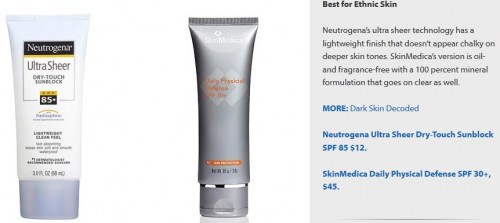One of our readers sent in an example of our cultural tendency to conflate “ethnic” with “non-white,” a conflation that renders whiteness invisible in discussions of race/ethnicity and its social impacts. You Beauty posted a slideshow about choosing an appropriate sunscreen, and the first slide highlights two that are “best for ethnic skin.” The accompanying text refers to “deeper skin tones” and includes a link to a story on “dark skin decoded”:
It’s a small example of the way that race and ethnicity are perceived more broadly in our culture, with whiteness taken as the neutral, as the absence of noticeable race/ethnicity, while “ethnic” is the marked, non-neutral state of all those who aren’t white.


Comments 15
Xiao Mao — June 20, 2012
Hate the word "ethnic". My mom uses it, and it sounds so racist. Ugh, "ethnic" is up there with "Oriental" and "Hispanic".
ididthatonce — June 20, 2012
I don't understand why they can't just say, "best on dark skin"? Last I checked (and please call me out on my privilege on this one), pointing out the actual physical characteristics of someone's skin was not racist.
Heck, I remember reading a Seventeen Magazine back in the day that listed the best colors for "light," "medium," "dark," and "olive-toned" skin. Not exactly rocket science to figure out which one you are there.
Robinliebman — June 20, 2012
I guess they mean "person of color"?
shorebird — June 29, 2012
I picked up a sunscreen in Havana last year that said it was for "children and people with white skin". This stood out to me because product marketing most often assumes a white consumer and so doesn't point out white skin. (It is important to note that dermatologists and and cancer prevention advocates are trying to dispel the misconception that only people with white skin need sunscreen.)
moionfire — July 4, 2012
These companies should just say brown, dark brown, light brown, beige, tan, etc rather than using buzz words.